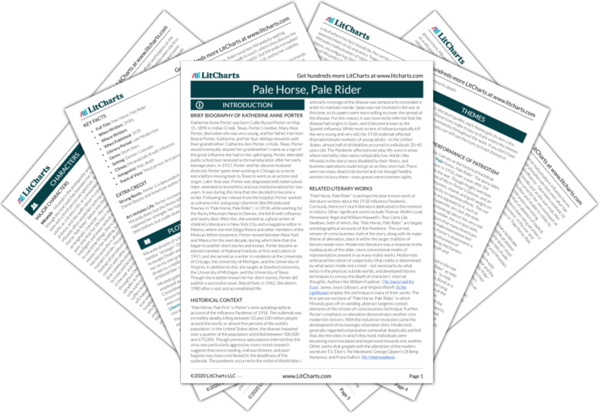The Performance of Patriotism
World War I serves as the historical backdrop across for “Pale Horse, Pale Rider.” The story takes place in Denver in 1918, over a year after the United States entered into the war. Though fought overseas, the war pervades every facet of life in Porter’s Denver, and an overwhelming sense of uselessness, shame, and guilt weighs on those unable to contribute directly to wartime efforts. The war even affects the characters who are opposed…
read analysis of The Performance of PatriotismAlienation
Throughout “Pale Horse, Pale Rider,” protagonist Miranda suffers with the feelings of loneliness, emptiness, and depression that result from a perpetual sense that she exists separately from the rest of the world. For Miranda, love and companionship are not enough to bridge this divide; she walks about in a daze of misery and isolation, and the only moments of comfort and understanding come when she is unconscious—either in the realm of dreams, or in…
read analysis of AlienationThe Denial of Death
Death surrounds Miranda. It confronts her in her dreams, in the funerals that fill the streets each day, in the ongoing war, and in the raging influenza pandemic that antagonizes her city and the rest of the world. Yet she refuses to acknowledge death upfront, choosing instead to allude to death indirectly: consciously through humor, and unconsciously in her dreams. In “Pale Horse, Pale Rider,” Porter explores the pervasive fear of death that…
read analysis of The Denial of Death
The Pain of Living
Although death appears to be Miranda’s greatest trouble, she ultimately realizes that there is an equal and opposite horror to be found in the pain of living. In “Pale Horse, Pale Rider,” Miranda undergoes a journey from healthy to dying and back again. From the beginning of the story, Miranda predicts that all is not well, and that something horrible will happen to her. Her premonition comes true when she falls gravely ill…
read analysis of The Pain of Living






